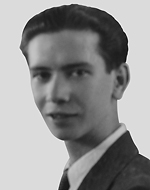Son of Charlotte and Solomon. Born on August 24, 1922, in Sofia, Bulgaria, brother to Tzila, he studied at the American School in Sofia until the age of 14. In 1936, when his parents felt that fateful events were moving on to their country and Europe in general, Immigration to the United States and Palestine. When we received and received what they wanted from the British Mandate authorities, the family immigrated to Eretz Israel. At first they lived in an absorption camp and later, after a short period in Bnei Brak, the family settled in Tel Aviv. The father had already worked in banking in Bulgaria, and thanks to his professional experience, he worked at a branch of a German bank that operated in Israel. Samuel began studying at the Geula School of Commerce in Tel Aviv, completed his command of the Hebrew language, and in 1941 successfully completed his studies. His thesis is preserved in the archives of the Hebrew University of Jerusalem. Near the end of his high school studies and in the middle of World War II, the German bank was shut down, like other factories that the British Mandate authorities suspected of being linked to the German enemy or interested in its success. Shlomo, the father of the family, found a new job as a civilian in a British military camp in Jerusalem, and as a result the family moved to Jerusalem and lived in the Makor Baruch neighborhood on Tachkemoni Street. Shmuel excelled in the real professions and was fluent in English since the days of the American school in Bulgaria. As a result, he became part of the British apparatus and also worked in the British compound of the Schneller camp near the family home. Despite his parents’ opposition, Shmuel joined the British army in January 1943 and served as a meteorologist at the Royal Air Force (RAF). Among other things, he served in Ismailia, Egypt, under the command of Eden, and was trained at a meteorological institute there. In August 1946, he was discharged from the British army with the rank of corporal. Throughout his service, Shmuel kept in touch with his parents and his sister. Immediately after his release, he began to prepare for advanced studies, received scholarships from the Mandatory government, and at the end of 1946 began his studies in the Department of Chemistry at the Hebrew University, on Mount Scopus in Jerusalem. Until the outbreak of the War of Independence – at the beginning of his second year of studies – he continued to live with his family. With the outbreak of the war, the Mount Scopus movement was made available in convoys secured by the British army. Most of the students were recruited to the Hagana and to security activities on the various fronts. His sister Tzila says that her brother Shmuel was among the reinforcements who fought in Gush Etzion. On the morning of April 13, 1948, a convoy left for Mount Scopus, after the British promised that the road was open and safe. There were a hundred and five people in this convoy: medical staff of Hadassah Hospital, Mount Scopus, Hebrew University workers, Haganah fighters, mountain defenders, patients, visitors and civilians. The road to Mount Scopus passed through the Arab neighborhood of Sheikh Jarrah, where the convoy encountered an ambush, with hundreds of Arabs attacking it and shooting at it. Some of the vehicles were able to escape and return, but two buses, an ambulance and a escort vehicle were ambushed. For many hours the convoy members fought and tried to prevent the Arabs from approaching the vehicles. Fire from our positions in the city and Mount Scopus, as well as armored vehicles sent to the area, failed to help the convoy. Seventy-eight people were killed in this attack. British military forces in the area did not intervene and did nothing to help, despite appeals to them. In the afternoon the Arabs managed to set fire to two buses on their passengers. Only in the late evening did the British intervene and rescue the survivors. Among the victims were students, students of the natural sciences and the chemistry department, who were active in the science corps that was in its infancyHe sang that Shmuel avoided them. Shmuel was among those who fell in a convoy on April 13, 1948. He was brought to rest in a mass grave in the cemetery in Sanhedria, Jerusalem, where he was survived by his parents and sister. The monument is located in the Sheikh Jarrah neighborhood on the Mount of Olives Street at the corner of Shimon HaTzadik Street.
